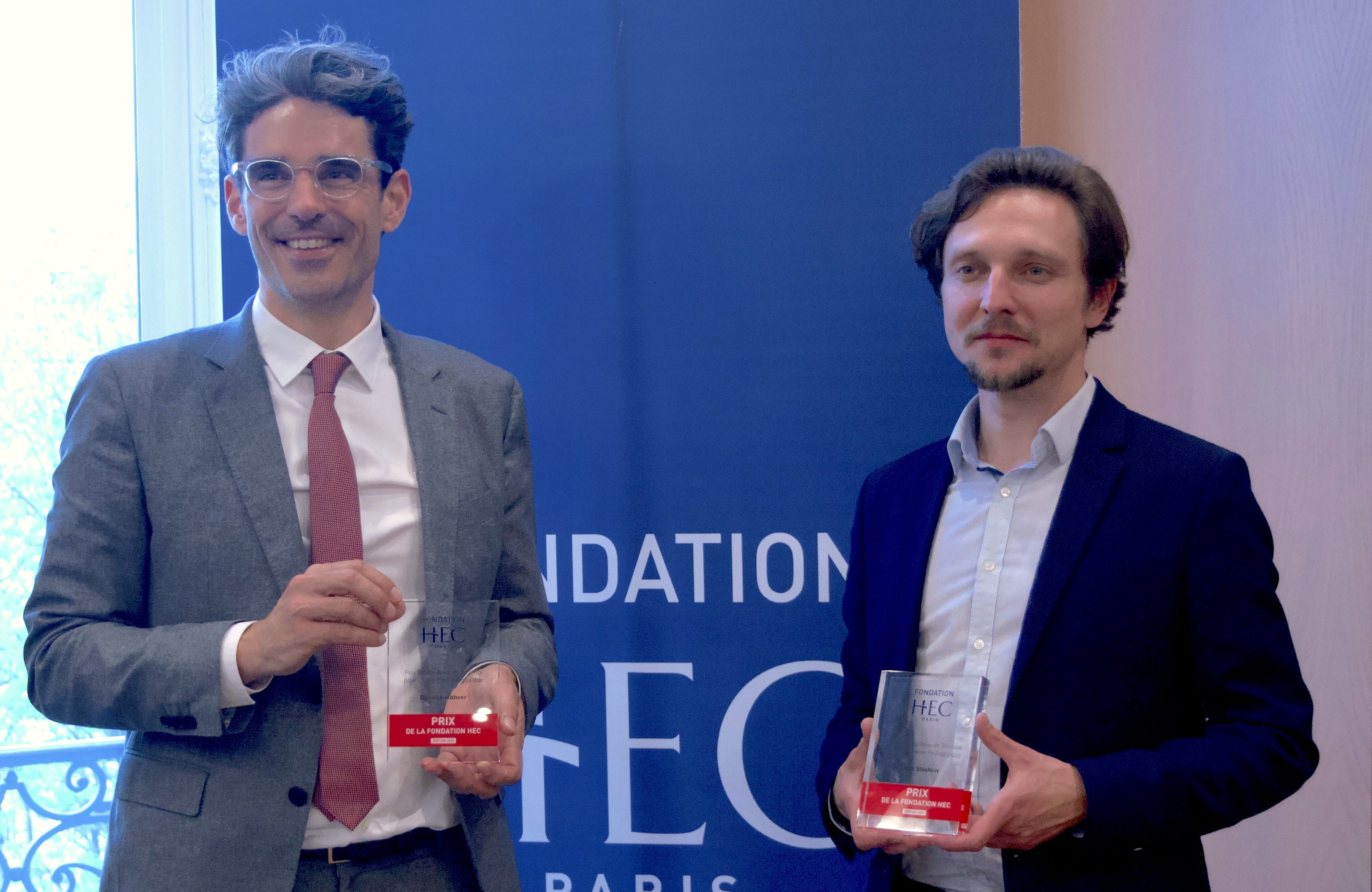HEC Foundation rewards Climate and Business initiative

The HEC Fondation hosted their awards ceremony at HEC Alumni this Monday, welcoming high profile professors and researchers. Among them, Igor Shishlov and Daniel Halbheer, two experts in climate economics, who created a certificate program on campus.
On Monday, the foundation had lined up five trophies. One was for PhD Claire Linares for her work on facial detection technologies in marketing. The crowd also paid tribute to professor Denisa Mindruta’s thorough research on management, technology and innovation, and to professor Pepa Kraft, who focused on accounting in the credit market. But the foundation also put the spotlight on an impactful program for future leaders : the Climate and Business Certificate.
Indeed, Executive Director Igor Shishlov (MSD.11) and FII chair Associate Professor on “Business Models for the Circular Economy” Daniel Halbheer were awarded the Prix Bruno Roux de Bézieux for their educational initiative. Starting from a blank page, they established a five-week intensive program to help navigate the complexities of climate change and transition towards net zero greenhouse gas emissions. A work that’s particularly relevant today as tackling environment related issues has also become a strategic question for companies and decision makers.
From macro to micro
The first successful edition of the program took place last year with support from personalities like François Collin, Chief Sustainability Officer at HEC. Along with Esp’R, a student organization that advocates for social economy and sustainability on campus, he gave precious feedback before the certificate was implemented. « It was extremely helpful to get their perspective and it made the overall package much more balanced, said Daniel Halbheer. We talked about ecological issues that probably wouldn’t be covered in a business school traditionally. »
The program aims to start with macro-level developments for students to gain global knowledge on climate science, negotiations and economics. It then moves on to micro-issues on how to implement the transition in different sectors. They get to discover analytical tools during case studies, for instance how to analyze GHG emissions profile of a company. After a focus on the financial aspects of the transition, the fourth week should be interesting for the ones who wish to « go a little bit beyond ». A part of the program where they get to « experience » the transition.
This year, the certificate partnered with the Campus de la Transition, a specialized organisation in the bucolic city of Forges, an hour away from Paris. There, they get to learn about the eco-lifestyles, ecology and ethics. Students also have the possibility of working on projects with EDF and Schneider Electric to solve real world decarbonation challenge these companies can face.

Getting ready for sustainability
Moving from fossil fuels to renewables is going to create countless jobs. Some of them might not even exist now. But this is not only about the energy sector. « On the second week of the certificate we have case studies from different sectors ranging from building to the shipping industry, from the automotive industry to IT, etc., said Igor Shishlov, who is also Head of Climate Finance at Perspectives, a consultancy. Jobs are being created everywhere. »
Both professors are confident many of the students are going to create their own companies aiming at solving some of the climate challenges. They also noticed a major shift regarding those concerns within corporations. « It used to be CRS (Corporate Social Responsibility), and it was kinda hidden in some dusty department, said Daniel, emphasizing the new role of Chief Sustainability Officers. These guys are building teams, and they need expertise on climate, biodiversity and energy transition. »
Young talents are more committed than ever
Likewise, even the most reluctant companies might need to reconsider their strategies to « acquire talents in the future.» Both Igor and Daniel noticed a major change in students’ personal aspirations. « There is a lot of push back. The young graduates refuse to work for fossil fuel companies, said Daniel. There is a strong resistance and it’s interesting to see. » Igor, also an HEC alumni, recalls studying for his masters twelve years ago. He finds students are now being « much more engaged, militant if I can say, on ecology and sustainability. »
Feeding on this spirit of boldness and change – as well as on their feedbacks – the professor aims at polishing the program every year : « It’s a constant improvement process. » Last year, participants have found it to be too Eurocentric. « We added a different angle and a couple of sessions looking at climate and energy transition in emerging economies », said Igor. This certainly echoes Ester Duflo’s talk on campus two weeks ago about the winners and the losers of the transition worldwide.
Published by Estel Plagué

